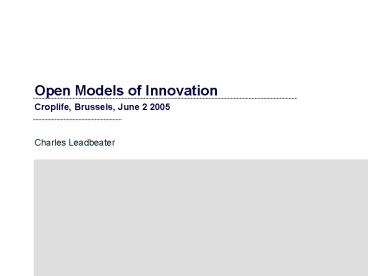Open Models of Innovation - PowerPoint PPT Presentation
1 / 12
Title: Open Models of Innovation
1
Open Models of Innovation Croplife, Brussels,
June 2 2005
Charles Leadbeater
2
Closed Innovation Organisations
- Hire bright people
- Put them in special conditions
- Free from market pressures
- Pipeline of ideas to products
- Delivered to passive waiting consumers
Open Innovation
3
Closed Innovation Assumptions
- Knowledge is created, codified, sent and received
- Authors of inventions can define their use
- Intellectual property should be protected to
create incentives - Consumption is passive - a yes/no choice
- Innovation comes from within, self-reflective
process
Open Innovation
4
Closed Innovation Applications
- The R D Lab Thomas J Watson, Bell Labs
- Specialist creative activities in companies
- Professional disciplines of architecture and
design - Elite university education
- The Pipeline view of the world
Open Innovation
5
Closed Innovation Reforms
- Not a fixed model
- Overlapping or simultaneous rather than
sequential - Cross functional teams in organisations
- Use consumer insights earlier in development
- Market oriented R D
Open Innovation
6
Open Innovation Generation
- Multiplying sources of ideas
- Technology costs down
- Combining ideas in networks easier
- Skilled labour more mobile, independent
- Outsourcing distribution of labour leading to
distribution of knowledge - End of knowledge monopolies
- A new phase of globalisation from money and
materials to ideas
Open Innovation
7
Open Innovation Propagation
- Consumers are innovators
- Radical innovations the users work out what
innovation is for - Disruptive innovation passionate users innovate,
producers follow - New markets and business models start in marginal
markets - Service innovation requires users to rewrite
scripts - Leisure economy Pro-Am users and serious leisure
- Who invented the mountain bike?
Open Innovation
8
Open Innovation Assumptions
- Innovation essential social and dynamic
- Authorship joint, cumulative and evolutionary
- Knowledge created by interaction
- Innovation as a mass activity
- Complex products should be modular
- Innovation comes from creative conversation
- Structured communities of co-creation
Open Innovation
9
Open Innovation Attractions
- Multiple experiments in parallel
- Mobilise fascination and curiosity
- Low cost maintenance - the users do it
- Users are part of the productive resource
- Continual evolution and accretion
Open Innovation
10
Open Innovation Organisations
- Open source communities - Linux, BIOS, Cambia
- Quasi open source shared platforms - IMEC
- Platform innovators a controlled commons -
Intel, the Sims - Innovators are orchestrators - Nokia
- Hybrids - some parts closed, others open - IBM
- Structured communities of co-creation achieve
complex tasks
Open Innovation
11
Open Innovation Challenges
- Who provides the kernel?
- What performance measures?
- Who decides what works or not?
- Where are the boundaries?
- How create a culture of self-motivated inquiry?
- Who leads the creative conversation?
- How do you mix public/private, collaborative and
commercial?
Open Innovation
12
Open Models of Innovation Croplife, Brussels,
June 2 2005
Charles Leadbeater































